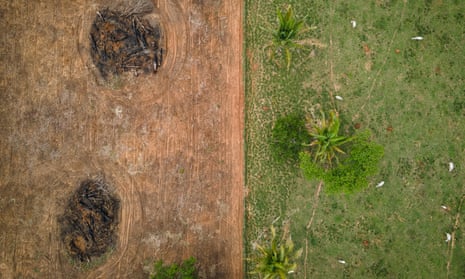
Global craze for collagen linked to Brazilian deforestation
Investigation finds cases of the wellness product, hailed for its anti-ageing benefits, being derived from cattle raised on farms damaging tropical forest
Tens of thousands of cattle raised on farms that are damaging tropical forests in Brazil are being used to produce collagen – the active ingredient in health supplements at the centre of a global wellness craze.
The links between beef and soya and deforestation in Brazil are well known, but little attention has been given to the booming collagen industry, worth an estimated $4bn (£3.32bn).
Collagen can be extracted from fish, pigs and cattle. Its most evangelical users claim the protein can improve hair, skin, nails and joints, slowing the ageing process. As well as beauty and wellness brands, it is also used by pharmaceutical companies and those producing food ingredients.
However, an investigation by the Guardian, Bureau of Investigative Journalism, Center for Climate Crime Analysis (CCCA), ITV and O Joio e O Trigo in Brazil has found cattle raised on farms causing deforestation were processed at abattoirs serving international collagen supply chains.
Some of this collagen can be traced to Nestlé-owned Vital Proteins, a leading producer of bovine collagen supplements. Vital Proteins’ collagen range is sold globally, including in the US and UK.
Jennifer Aniston, the actor and chief creative officer of Vital Proteins, has called collagen “the glue that holds everything together”. She claims to have been using it for years, adding it to her morning coffee.
While there are studies suggesting taking collagen orally can improve joint and skin health, Harvard School of Public Health cautions potential conflicts of interest exist as most if not all of the research is either funded by the industry or carried out by scientists affiliated with it.
READ RELATED: Former NYT staffer describes the freak-out following the publishing of Tom Cotton's op-ed
Collagen companies have no obligation to track its environmental impacts. Unlike beef, soya, palm oil and other food commodities, collagen is also not covered by forthcoming due diligence legislation in the EU and UK designed to tackle deforestation.
Nestlé said that the allegations raised are not in line with its commitment to responsible sourcing and that it has contacted its supplier to investigate. It added that it is taking steps to “ensure its products are deforestation-free by 2025”.
Bovine collagen is described as a byproduct of the cattle industry, which in Brazil accounts for 80% of all Amazon forest loss.
But “byproduct” is a misleading term, according to campaigners. Non-meat products, of which leather and collagen are the most valuable, account for just under half a slaughtered cow’s weight and can generate up to 20% of meatpackers’ incomes, according to the USDA.
Demand for beef, leather and collagen has seen more and more forest has been cleared and replaced by pasture in recent years, with land often seized illegally.
Most livestock-driven deforestation can be attributed to companies’ indirect suppliers, according to Ricardo Negrini, a federal prosecutor in Brazil’s Pará state who monitors beef processors’ climate commitments.
Cattle are often moved from farm to farm for different stages of rearing, so a cow born on deforested land may be fattened for slaughter at a “clean” finishing ranch. But Negrini said that, today, all meat companies have the capacity to track the origins of the cattle they buy.
-
This story was produced with support from the Pulitzer Center’s Rainforests Investigations Network
Source: Health & wellbeing | The Guardian



